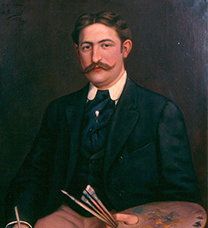| Ernest de Saisset | |
|---|---|
 Self-portrait (c.1895) Self-portrait (c.1895) | |
| Born | Ernest Pierre de Saisset 1864 San Jose, California, U.S. |
| Died | 1899 San Jose, California, U.S. |
| Alma mater | Santa Clara University, Académie Julian |
| Known for | Painting |

Ernest Pierre de Saisset (1864 – 1899) was an American painter, he is best known for landscapes, portraits and nudes. The De Saisset Museum in Santa Clara is named after him.
Biography
Ernest de Saisset was born in 1864 in San Jose, California. His father, Pedro de Alcântara Brasileiro de Saisset (1829–1902), was the illegitimate son of Pedro I & IV, King of Portugal and Emperor of Brazil. Upon immigrating to California to take advantage of the Gold Rush, becoming a businessman and French consular agent; later serving as Vice-Consul. Years later, he helped incorporate and served as President of the Brush Electric Light Company branch in San Jose. Ernest's mother, Maria de Jesus (Jesusita) Palomares (1832–1907), was the widow of Jose Suñol (a son of Don Antonio Suñol) and had owned a large ranch. Palomares had three daughters from her prior marriage, Maria "Lola" Dolores A. Suñol (1851–1910), Narcisia Meleton Suñol (1853–1894) and Maria Josefa Brigida Suñol (1854–1906). Together Pedro de Saisset and Maria Palomares had four children together: Henrietta, Ernest, Pierre, and Isabel (1876–1950).
Ernest attended classes at Santa Clara College starting at age 16. While there, he took classes in French, elocution, calligraphy and design, and received an award in 1883 for an oil painting. During the final year of his studies, Ernest studied painting with Fr. Bartholomew Tortone, who approved of his work. Since art instructors were in short supply in pioneer California, the de Saisset family sent Ernest to Paris for further study in art at Académie Julian. With the assistance of an uncle who lived there, he was able to find a studio near the Académie. He stayed in Paris for nine years altogether, studying with Jules Lefebvre, Jean-Joseph Benjamin-Constant and William Bouguereau, among others. At one point, he tried to set up an exhibit at the Salon, but was discouraged by what he felt was favoritism for native-born French people.
In 1895, he returned to California; painting nudes, landscapes and numerous portraits. He died only a few years later in 1899, at the age of thirty-five, of what was diagnosed as "rheumatism".
His sister Isabel de Saisset, who died in 1950, bequeathed a large sum for the establishment of an art museum, to be named in his honor, at Santa Clara University. The De Saisset Museum was dedicated in 1955, and contains most of his extant paintings.
References
- ^ Pen Pictures From The Garden of the World or Santa Clara County, California, Illustrated. H. S. Foote (editor). Chicago, IL.: The Lewis Publishing Company. 1888 – via The Valley of Heart's Delight, Santa Clara Research.
{{cite book}}: CS1 maint: others (link) - ^ "Guide to the Pedro de Saisset Family Collection, circa 1860-1950". Online Archive of California (OAC), California Digital Library. Retrieved 24 October 2020.
- Hughes, Edan. Artists in California 1786-1940.
- "Exhibit at de Saisset Museum Explains the History of Museum's Namesake". The Silicon Valley Voice. 1 June 2016. Retrieved 24 October 2020.
- California History, volume 79, California Historical Society, 2000, pg. 177.
- De Saisset family history @ Santa Clara University.
- "Museums, de Saisset Museum". City of Santa Clara. Retrieved 24 October 2020.
Further reading
- "Ernest Pierre de Saisset (1864–1899)". Who Was Who in American Art: Compiled from the Original Thirty-four Volumes of American Art Annual--Who's who in Art, Biographies of American Artists Active from 1898-1947. Peter Hastings Falk (editor), Newport Art Museum, White Plains Public Library. Sound View Press. 1985. ISBN 9780932087003.
{{cite book}}: CS1 maint: others (link)
External links
- Ernest de Saisset at Find a Grave
- deSaisset museum official website
- de Saisset Family Papers at Santa Clara University